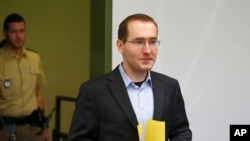A former employee of Germany's BND foreign intelligence agency who is charged with treason gave the U.S. Central Intelligence Agency (CIA) 200 secret documents, prosecutors said at the start of his trial on Monday.
The arrest last year of the man, identified as Markus R., cooled relations between Berlin and Washington, close allies during the Cold War and afterwards, and followed revelations that the U.S. National Security Agency (NSA) snooped on Germany.
The 32-year-old man, who has suffered from a disability since early childhood that affects his mobility, is accused of passing information to the CIA from 2008 until mid-2014 in return for at least 95,000 euros ($102,000).
He received the money from a handler named as Craig during meetings in Salzburg and other Austrian cities, prosecutors said. "At the BND I had the impression that nobody found me credible," the defendant told the Munich court. "With the CIA it was different. One could prove himself."
Known as Uwe to his handlers, who included a CIA agent named Alex, Markus R. provided the Americans with details on the BND's structure, key activities, deliberations and collaboration with foreign spy agencies, prosecutors told the court.
They said the CIA gave him a notebook with a special email program, which he used to provide the agency with almost weekly updates. In mid-2014, Markus R. also handed over three documents to the Russian consulate in Munich, they said.
Wearing a dark gray suit, Markus R. appeared shy as he answered questions put forward by the judge. He grew up in former East Germany with a locksmith father and a mother who worked as a precision mechanic. He had an interest in computers.
Arrested in July last year, he was charged on Aug. 11 this year on two counts of treason, breaking official secrets and corruption. A guilty verdict could mean a life sentence.
Markus R. had worked from December 2007 for the BND and soon afterwards offered help to the CIA, prosecutors said. From May 2008 until his arrest, he worked in a department responsible for the protection of soldiers serving abroad, with access to sensitive material.
The documents he passed to the Russian consulate in Munich also posed a security risk to Germany, prosecutors said.
Fugitive former NSA contractor Edward Snowden revealed two years ago the extent of U.S. surveillance in Germany, which included bugging the phone of Chancellor Angela Merkel.





